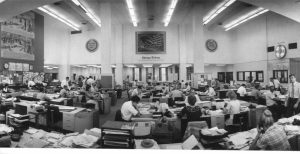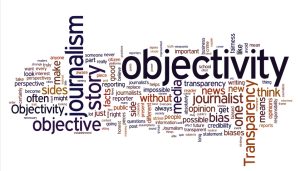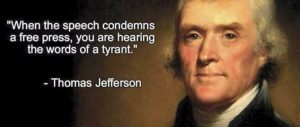I spent nearly 30 years of my life working as a journalist. It was an honor to be a member of what some have called The Fourth Estate.
I began my career in the Windy City at the Chicago Tribune. At the time, Chicago was probably Journalism’s most brutal and most relentless proving ground. I had just graduated from the William Allen White School of Journalism at the University of Kansas. It was a good education, but when I arrived inexperienced and unproven in the cavernous Tribune newsroom, it didn’t take long for me to realize that I had a long way to go before I earned my journalistic chops.
Chicago, I quickly learned, was a damned tough newspaper town.
I worked five years covering every kind of story imaginable: cops, crime, fires, disaster, the good, the bad, the ugly. I worked the most ungodly hours possible: 5 p.m. to 1 a.m., midnight to 8 a.m., and 9 to 5 the hard way (that’s 9 p.m. to 5 a.m.).

Eventually, I was tabbed to be one of five reporters to write a front-page feature column called “Column One.” We were given carte blanche to write columns about anything that tickled our fancy. I wrote columns about drive-in funeral parlors, high-rise mausoleums, ancient astronauts, The Rosicrucians, and buying mail-order coats of arms.
A year later, the Tribune made me a foreign correspondent—a job I held for about 17 years covering Asia and Latin America. At the time, I thought being a foreign correspondent was the best job in journalism. I still think that.
When I look back at my 27-year career with the Tribune, I realize how fortunate I was to be a journalist between the early 1970s and late-1990s. Those years were an apogee of a golden era for newspapers. Today, the traditional print newspaper is disappearing, devoured by Big Tech, social media, and the Internet.
I am grateful I had the opportunity to work in a classic Big City newspaper newsroom, with its inharmonious symphony of ringing telephones, the strident clacking of typewriters, and shouts of “copy” by harried reporters on deadline.
I loved all of it—the pressure of writing stories on deadline, the intense competition, the satisfaction of “beating” the Sun-Times or the Daily News on a story, the camaraderie, and hoisting a few in the Boule Mich or Ricardo’s or one of the other watering holes frequented by Chicago newspaper hacks.

When I began my career, Chicago had five competing newspapers, and compete they did. You learned to be fast and observant, but most of all, you learned to be accurate and fair. If opinion crept into one of my stories, some crusty, in-your-face editor would let me have it.
“Yates, keep your opinions out of your stories,” he might thunder. “Nobody gives a crap (or some other suitable expletive) what YOU think.” Then, with his big black pencil, he would eliminate what I was sure was some of my best insightful prose.
Sadly, that is NOT the mentoring (or hectoring) that is de rigueur in today’s newsrooms. The result is often sloppy, inaccurate journalism and stories filled with reporters’ attitudes, biases, and judgments.
That is NOT journalism. That is propaganda. Joseph Goebbels would applaud the misleading and dishonest stories I see today in newspapers and on network television and cable news shows. So would Pravda, the erstwhile Soviet Union’s disinformation outlet.
It is distressing to see the profession I was once proud of decline into a morass of misinformation, indoctrination, mendaciousness, and bias.
Am I exaggerating? No, not when reputable journalism organizations like the Pew Foundation and others report that coverage of the Trump administration was 90 to 95 percent negative.

Meanwhile, media coverage of President Biden remains 85 percent positive, despite the highest inflation rate in 40 years, the highest national crime rate in 50 years, the disastrous withdrawal from Afghanistan, and the ongoing FBI investigation of Biden’s son Hunter and his questionable financial dealings with China’s ruling Communist Party—to name just a few negative episodes in the ongoing Biden presidency.
According to a recent Gallup Poll, Americans’ trust in the media to report the news fully, accurately, and with fairness has edged down four percentage points since last year to just 36%, making this year’s reading the second-lowest in Gallup’s trend.
In contrast, from 1972 to 1976, 68% to 72% of Americans expressed trust in the mass media; yet, by 1997, when the question was next asked, that confidence had dropped to 53%. Trust in the media, which has averaged 45% since 1997, has not reached the majority level since 2003.
So, as you can see, my discontent and regret with America’s deteriorating news media are not based on some eccentric impression. It’s real.
Too many reporters are not doing their jobs. Just look at the softball questions the White House press corps lobs at Biden press secretary Jen Psaki—a glaring divergence from the abusive invectives that the three Trump press secretaries endured for four years.

I think the American media gave Adolph Hitler, Benito Mussolini, and Hideki Tojo more dispassionate and impartial coverage during World War II than it did to Donald Trump.
Okay, we can all argue that’s politics. It’s a big boy and big girl game. The meek and weak need not apply. If you can’t take the heat, get out of the kitchen, etc., etc., etc.
But I’m not talking about the hostile and profane world of politics.
I’m talking about our news media—the so-called “Fourth Estate” that allegedly strives for objectivity, fairness, balance, and responsibility.
Someone once said an effective national news media should “comfort the afflicted and afflict the comfortable.”
I’m not sure if I agree with that characterization.
I am more inclined to believe that quality newspapers, broadcast, and cable news organizations should foster a nation that talks to itself—not one that screams at, threatens, and divides people based on race, religion, political belief, or ethnicity.
I want to believe a few journalists out there still consider it their job to provide readers, viewers, and listeners information that is as free as possible from personal bias and political dogma.
I want to believe that journalism is still a critical cog in freewheeling national discourse—one that encourages informed discussion and debate, not one that censors it or skews it to fit a pre-determined narrative.

I want to believe what the Society of Professional Journalists—an organization I have belonged to since 1969—says in its preamble to its code of ethics:
“Members of the Society of Professional Journalists believe that public enlightenment is the forerunner of justice and the foundation of democracy. Ethical journalism strives to ensure the free exchange of information that is accurate, fair, and thorough. An ethical journalist acts with integrity.
“The Society declares these four principles as the foundation of ethical journalism and encourages their use in its practice by all people in all media:
- Seek Truth and Report It
- Minimize Harm
- Act Independently
- Be Accountable and Transparent”
I want to believe today’s journalists abide by those ideals. I want to believe they do, but sadly, I fear too many no longer do.
And that causes me great anguish. Because I truly believe journalists have a critical role in keeping our republic free by providing accurate and unfettered information to the electorate.
Unfortunately, that role has been pushed aside in favor of one that too often resembles propaganda rather than impartial, evenhanded, and truthful news.
I want to believe that isn’t what has happened to my old profession. But I can’t because I think journalism has lost its way and can no longer be trusted by the American people.
And that is not only a sad state of affairs; it is a clear and present danger to our republic’s survival.
(Please feel free to comment. I want to know your thoughts on all of the posts that appear on ForeignCorrespondent. It is now easy to comment. Just go to the “Leave a Comment” box below.


Ron, This is the column the NYT and Washington Post should run on their editorial pages. Do they still have Letters to the Editors? If so, you should mail it and let us know if they would print it. Thank you.
Neither the Post nor the Times would run my post for the very reasons I outlined in it. Their biases are too deeply entrenched to allow any alternative opinions to their common dogmas.
Great article! I fear that there is no return to the era of journalism that you describe. I no longer trust the News, Justice Department, FBI, Military or the Supreme Court. All politicized. I miss the Golden Years that you describe.
I miss them too. I normally don’t believe in “golden eras,” but I do when it comes to honest journalism that reports fairly and doesn’t tell people how they should think.
You are absolutely correct, Ron. There is no way they would run your article.. Biased or bought? There is so much negative news that today’s journalists are simply “rag magazine” reporters just wanting to sell a story, no matter how accurate it was. Remember the days when a journalist had to be accurate or risk the humiliation of having to print a retraction? Today’s reporters knowingly report untruths that will stick in the minds of the reader, regardless of the truth.
And the same goes for news broadcasting. You never knew the political affiliation or the opinion of Walter Cronkite, Chet Huntley, David Brinkley, Peter Jennings, Tom Brokaw. They simply reported the news. They all had integrity, which is, quite sadly, a lost trait. Cable news today is a joke because it is so biased on BOTH sides. I used to listen to Hannity, but he is just as biased on his side as Anderson Cooper and Bill Maher are on theirs. Quite frankly, I am sick of them all. No one has RESPECT for anyone else any longer. Can you imagine if Johnny Carson had openly disrespected the President of the United States in his monologue? Now, late night hosts use them as the bunt of their jokes. If I want to hear the news, I listen to my local news or NPR.
Thanks for the comments, Barbara. It is difficult for me to watch what has happened to my old profession. It’s no longer about reporting the news, but promoting the narrative and opinions of the reporter and his/her news organization. Sadly, NPR has lost its way also, Barbara. When I was the Dean of the College of Media at the U of Illinois, WILL-TV-Radio (the PBS-NPR affiliate for central Illinois) was part of my college. I was often dismayed at the occasional politicization of the news in the 1990s and early 2000s. Today, NPR has lost all pretense of being an objective news organization. Its coverage of the Trump administration was disgraceful and its indulgent and lenient coverage of Biden is reprehensible. As with most of the mainstream media today, they are lapdogs of this administration, not the watchdogs they are supposed to be.